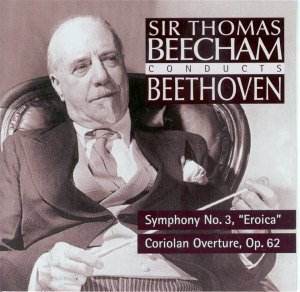The Eroica wasn’t as problematical a recording as
the Pastoral. Beecham and the RPO went into the recording studios
on 20th and 21st December 1951 returning in August
1952 to cover some edits of the first and third movements. He conducted
the Eroica at least forty times during his career and it was, in fact,
the last Beethoven Symphony he was to conduct, in Chicago in 1960. It
goes without saying that the RPO is on splendid form with particularly
notable contributions from Jackson, McDonagh, Brymer and Brooke and
there is a pervasive sense of alluring tonal beauty throughout, though
not a preening one.
There is a real sense of articulated clarity in the
opening movement, especially in the strings. Tuttis are never saturated,
the orchestral weight never becomes heavy, with the basses subsumed
into the string patina – this is certainly not a Germanic "bass-up"
performance; sonorities are equable, accents are often adroitly cushioned,
second violin entries always audible and full of character. It’s certainly
not the quickest of first movements and doesn’t quite possess the blistering
concentration of symphonic weight that some of his contemporaries would
generate from the score. It is nevertheless full of incident and imagination.
The Marcia funebre is proportionately sized; it possesses weight
and seriousness but not Brucknerian depth. Beecham’s performance perhaps
amplifies something that Neville Cardus wrote when he noted that Beecham
had "rid the music of nineteenth century weightiness and tonal
gestures supposedly earth-and –heaven shattering."
His rhythmic acuity and impetus is the means by which,
instead, he conveys thematic causal connections, how he generates motion
through almost imperceptible rubati. There is a generous fluidity to
his music making here but not one that aspires to the unshakeably monumental.
This applies especially to the Scherzo – though this is rather more
Allegro than the modified Allegro vivace as marked. The finale is ruminative,
measured and whilst rhythmically supple occasionally fitful. Oboist
Terence McDonagh shines here especially but all the principals are superb.
No overwrought sonorities impose themselves in Beecham’s conception,
which is serious and understated and never superficial. Coriolan is
full of elegance and dynamic gradients, vigorous orchestral exegesis
and drama, and admirable. Notes are once more by Graham Melville-Mason.
I like the photographs of a Beecham variously avuncular, amused, thoughtful
and pensive; it complements his Beethoven enshrined within.
Jonathan Woolf


